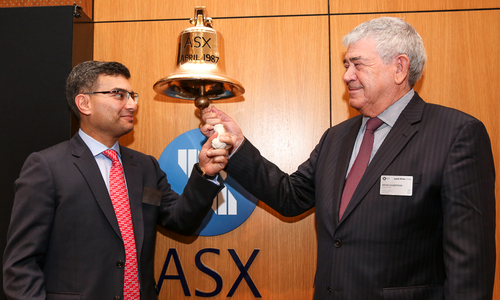The heavily oversubscribed IPO raised A$240 million, though that was via existing shareholders selling their shares rather than the company receiving the funds.
Jupiter has a market capitalisation of about A$750 million. Aside from the listing (via demerger) of South32 in 2015, it makes Jupiter the largest mining float since 2010.
Hartleys is lead manager to the initial public offering, with Foster Stockbroking and Aitken Murray Capital Partners as co-managers.
Speaking after the listing in Sydney this morning, Jupiter CEO Priyank Thapliyal said the IPO had been a quick process due to the "simplicity of the story".
Jupiter delisted from the ASX in early 2014 due to illiquidity, with nearly 90% of the company being held by Pallinghurst Resources, and what the company believed was a low valuation at the time.
Chairman Brian Gilbertson said the company's low share price in 2014 coincided with "the middle of a five-year bear market".

Jupiter CEO Priyank Thapliyal and chairman Brian Gilbertson ring the bell at the ASX
Jupiter owns a 49.9% stake in the Tshipi manganese mine in South Africa.
The company reported robust financial results for the operating subsidiary for the year to February 28.
Sales jumped to 3.34 million tonnes from 2.27Mt and revenue rose to R7.33 billion from R3.7 billion.
Earnings before interest, tax, depreciation and amortisation more than doubled to R3.1 billion, while net profit after tax jumped from R891 million to R1.9 billion.
The average price for 37% manganese averaged US$4.74 per dry metric tonne unit.
Costs are averaging around $2.20/dmtu.
Sales are running at a rate of 3.3 million tonnes per annum, but the company has the flexibility to adjust it to 3-3.6Mtpa.
Thapliyal said the operating and sales strategy for the current financial year was broadly the same, and the jump in manganese prices to $7.23/dmtu was resulting in strong cashflow.
"Product has been sold through to April which will result in cash in the bank for Tshipi of approximately R1.5 billion at the end of May," he said.
"Should the markets hold, this raises the prospect of a substantial HY2019 distribution to Tshipi shareholders, and in turn to Jupiter shareholders under the company's dividend policy as stated in the replacement prospectus."
The board is planning to target a 70% payout ratio of the income and cash distributions received from Tshipi.
Jupiter shares opened at 39c, just below the 40c IPO price, and dipped as low as 36.2c.
"I would be astonished if it stays at that level," Gilbertson said.


























